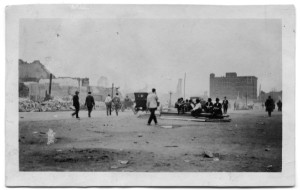
This photo shows the destruction in Paris, Texas, after the March 1916, fire destroyed nearly 30 blocks of the city.
The spring of 1916 was typical of Texas weather. No rain and high winds seared the countryside and towns alike. The lack of rainfall and potential for a prolonged drought sent cotton markets in New Orleans and New York teetering.
The worst fear was fire, buffeted by the high winds. One such fire broke out in downtown Houston and threatened to obliterate businesses, courthouses, hospitals, and the population before it was controlled. At a small town in Texas a young boy set the grass afire as a practical joke in March. The wind spread flames to within yards of the local schoolhouse. Thanks to heroic action by local men, the children and teacher were saved. Who knows what happened to the boy, but if I were a gambling person, I would say it wasn’t pleasant.
Right after noon on March 22, 1916, fire broke out in a warehouse on the Texas and Pacific Railway right of way in Paris. The high winds and dry conditions buffeted the fire through approximately thirty blocks of homes, business, banks, churches, the courthouse and jail, and the fire station. The fire raged all afternoon and through the night. As one newspaper reported, the fire “took all before it, then the wind changed and the fire took all behind it.” Fire departments from Dallas, Greenville, Bonham, and Hugo, Oklahoma, arrived to help. It was possible that night to see the glow from the fire as far away as Greenville.
Miraculously only three people lost their lives. Two were found in their homes and a fifty-year-old woman died from heart failure. Three churches were destroyed. The jail was evacuated. Court records lost. Because hotels, restaurants, and grocery stores were destroyed, Paris found itself without food or shelter. Those persons whose homes were safe and intact churches and schools took in most of the homeless. But the almost total loss of food was devastating.
Surrounding towns and cities immediately organized food drives. Trains from as far away as Fort Worth brought in carloads of food and clothing. The citizens of Paris were grateful but determined to recover with as little outside help as possible.
Within a week, storm clouds entered North Texas and broke the drought, but brought damaging windstorms around Denton. Greenville and this part of Texas received beneficial rains with no wind.
On the twenty-eighth of March, fire of unknown origin destroyed sheds and offices of the Greenville Lumber Company. At first the fire seemed to be contained at the lumberyard, but by the next day it became clear that seven homes were destroyed and eight others damaged. No alarm was sounded until the fire had a good start and, once again, high winds caused it to spread rapidly.
As an aside, I am working on a piece about a murder that occurred in Paris in December 1915. The man suspected of committing the crime was in jail at the time of the fire. As I tried to find as much as I could about the circumstances I telephoned the Lamar District Clerk. I must have piqued her interest. She told me about the fire and loss of records, but said since the trial occurred in late April 1916, there might be intact records. There were and she graciously sent me the copies of indictments. As I read about the fire, I realized that the Paris Morning News office was completely destroyed. But they were back in business in no time, thanks to another newspaper press in a neighboring town.

Hi Carol…….I just discovered your blog and look forward to reading all of it. You addressed street names. That has long interested me. Wesley and Church are easy to understand. Gordon and Jordan????? My family`s store, Treadway Bros, was on Lee at one of the above. Of interest to me is the community of VanSickle because my paternal great grandmother was a VanSickle. That was a huge family who immigrated to TX. In the cemetery are many ancestors with the name Treadway/Tredway. I love to visit there.
My GHS class of 1956 is having a reunion Oct 15. Do you have any interest in visiting with some of us? We know old Greenville but may differ on some details. Keep researching/writing. KAY